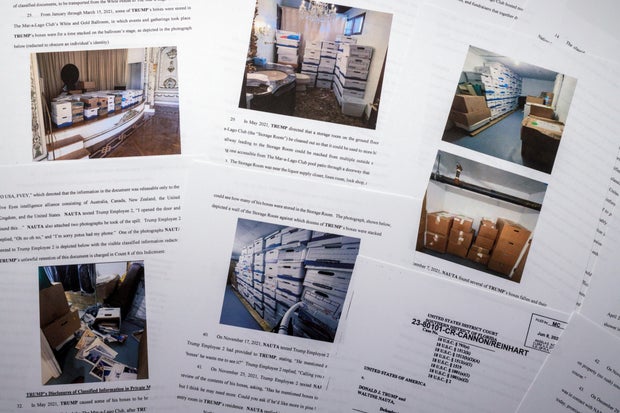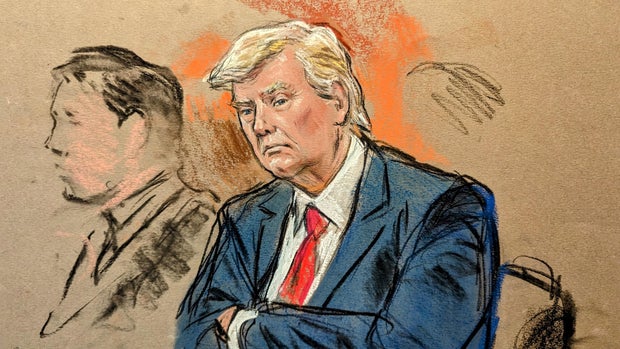Washington — The unprecedented federal charges filed against former President Donald Trump in early June are the first step in the legal proceedings that will unfold as Trump mounts his third bid for the White House.
Made public on June 9, the indictment marks the first time in history a former president has been charged by the Justice Department. Trump’s prosecution is the culmination of a nearly two-year-long effort by the U.S. government to recover records from his South Florida property, Mar-a-Lago, after his presidency ended in January 2021.
Trump has pleaded not guilty to all 37 felony counts related to his alleged mishandling of classified documents and a tentative trial date has been set. But there is still much that will take place before a jury renders its verdict in the case of United States of America vs. Trump.
Here is a timeline of the events that have occurred since Trump was indicted on charges stemming from his handling of sensitive government records:
2023
June 8: A federal grand jury votes to indict Trump on charges stemming from the investigation into his handling of sensitive government records recovered from Mar-a-Lago after he left the White House.
Trump himself announces that he was informed of the indictment in a trio of posts to his account on Truth Social and proclaims that he is an “innocent man.”
The charges are the first to arise from special counsel Jack Smith’s investigation into Trump’s handling of government records recovered from Mar-a-Lago after his presidency concluded.
June 9: The indictment filed against Trump is made public, detailing the charges the former president is facing. The document lists 37 felony violations:
- 31 counts of willful retention of national defense information
- 1 count of conspiracy to obstruct justice
- 1 count of withholding a document or record
- 1 count of corruptly concealing document or record
- 1 count of concealing a document in a federal investigation
- 1 count of scheme to conceal
- 1 count of making false statements and representations
At least four of the charges carry a maximum penalty of 20 years in prison.
The indictment names Waltine “Walt” Nauta, an aide to Trump who served as a White House valet, as a co-conspirator in five of the counts, and charged him individually with making false statements.
The indictment alleges that Trump “endeavored to obstruct the FBI and grand jury investigations and conceal retention of classified documents,” and says the classified documents Trump kept in boxes at Mar-a-Lago included information about defense and weapons capabilities of both the U.S. and foreign countries, as well as U.S. nuclear programs.
The filing includes colored photos showing stacks of boxes that were stored in different rooms around Mar-a-Lago at various times, including on stage in a ballroom, in a bathroom next to a shower and toilet, and in a storage room.
Jon Elswick / AP
“The unauthorized disclosure of these classified documents could put at risk the national security of the United States, foreign relations, the safety of the United States military, and human sources and the continued viability of sensitive intelligence collection methods,” the indictment states.
The 31 counts of willful retention of national defense information stem from 31 records that were recovered by federal investigators on June 3, 2022, when Trump’s representatives turned over records bearing classification markings in response to a subpoena, and on Aug. 8, 2022, when the FBI conducted a court-authorized search of Mar-a-Lago. Nearly all of these documents are marked top secret or secret, and some include information about U.S. military activities and nuclear capabilities.
Federal prosecutors say that Trump showed classified documents to others on two occasions: In July 2021 during a meeting with a writer and publisher at Trump National Golf Club in Bedminster, New Jersey; and in August or September 2021 during a meeting with a representative from his political action committee at his Bedminster property.
After the indictment is revealed, Smith delivers brief remarks on the charges and encourages all Americans to read the document to “to understand the scope and the gravity of the crimes charged.”
“We have one set of laws in this country, and they apply to everyone,” the special counsel says. “Applying those laws, collecting facts — that’s what determines the outcome of an investigation. Nothing more and nothing less.”
Trump, meanwhile, spends the day at his club in Bedminster, golfing with GOP Rep. Carlos Gimenez of Florida, who tweets a photo of himself alongside the former president on the course.
U.S. District Judge Aileen Cannon, who was named to the bench by Trump, is assigned to preside over his case. Cannon, whose chambers are in Fort Pierce, Florida, oversaw legal wrangling in 2022 over the FBI’s execution of the search warrant at Mar-a-Lago. In that dispute, she granted Trump’s request for an independent third party, or special master, to review the records seized by federal agents. She also ordered the Justice Department to temporarily stop using the recovered materials for its investigation pending completion of the special master’s review.
Cannon’s ruling was widely criticized by legal experts and ultimately reversed by the U.S. Court of Appeals for the 11th Circuit in a unanimous ruling.
June 13: Trump appears in federal court in Miami for his arraignment before U.S. Magistrate Judge Jonathan Goodman and pleads not guilty to all 37 counts.
He is released on his own recognizance following the 45-minute proceeding. As a condition of his release, Trump is prohibited from speaking about the case with Nauta and other potential witnesses identified by the government. He is not required to relinquish his passport, and the judge does not impose limits on domestic or international travel.
William J. Hennessy, Jr.
Hours later, Trump delivers a speech from his Bedminster club and again claims he had “every right” to keep the classified documents under the Presidential Records Act. In fact, the law requires all presidential records to be turned over to the National Records and Archives Administration at the end of their administrations.
Trump rebukes the indictment as “the most evil and heinous abuse of power in the history of our country” and claims his prosecution is politically motivated, given that he is the front-runner for the GOP presidential nomination.
June 19: Federal Magistrate Judge Bruce Reinhart issues a protective order that lays out a series of restrictions regarding the evidence the Justice Department collected during its investigation, which will be turned over to Trump’s legal team as part of a process known as discovery. Smith requested the protective order on June 16, and it was unopposed by Trump’s lawyers.
Reinhart’s order states that discovery materials must be securely kept in the “custody and control” of Trump’s lawyers. Trump and his attorneys are prohibited from disclosing the information or their contents “directly or indirectly” to anyone other than those working on his defense, people interviewed as potential witnesses, lawyers for potential witnesses or others the court may authorize.
Trump and Nauta, his co-defendant, can only access the discovery materials under the “direct supervision” of their lawyers or their staff, according to the filing. Any notes taken by Trump and Nauta regarding the records must be stored securely by their legal teams.
The protective order also states that “the Discovery Materials, along with any information derived therefrom, shall not be disclosed to the public or the news media, or disseminated on any news or social media platform, without prior notice to and consent of the United States or approval of the court.”
If the terms of the order are violated by Trump, Nauta or their lawyers, they face being held in contempt of court or other “civil or criminal sanctions,” Reinhart wrote in the filing.
June 20: Cannon issues an order setting a trial date in the case. The two-week proceeding is set to begin Aug. 14 and will take place at the federal courthouse in Fort Pierce. She also sets a July 24 deadline for all pre-trial motions from both sides — Trump and the Justice Department — to be filed.
The trial date, however, is likely tentative, since Trump’s lawyers are expected to file a number of motions that could delay its start. Cannon says in her order that any motions to move the trial date “must set forth in detail which factors” she should consider that constitute the grounds for a continuance, including the complexity of the case and the process for obtaining security clearances.

